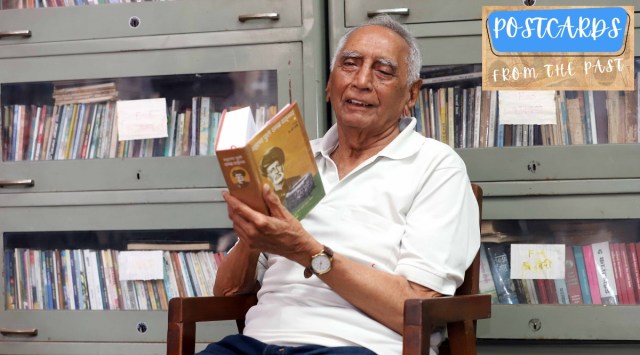Click here to join Express Pune WhatsApp channel and get a curated list of our stories
Postcards from the Past: Amid droughts and labourers’ struggles, Baba Adhav emerged as a champion of the unorganised in Pune
Now 93 years old, social activist Babasaheb Pandurang Adhav recalls the troubles that plagued Pune from the 1950s to the 70s, the exploitation of hamals, their unionisation and growth.
 Baba Adhav played an important role in the growth of trade unions and social movements in Pune during the 1960s and 70s. (Express photo by Pavan Khengre)
Baba Adhav played an important role in the growth of trade unions and social movements in Pune during the 1960s and 70s. (Express photo by Pavan Khengre) Baba Adhav was sitting in his medical clinic in Pune’s Nana Peth in 1953 when a few men came to inform him that workers and guests had begun to arrive for the lecture he was supposed to deliver at a chowk around the corner.
Putting aside his stethoscope and forgetting all about the syringes he had put in boiling water for sterilisation, Baba rushed to the chowk, where workers would gather every Wednesday and Saturday night for meetings, and delivered the lecture. It was this kind of energy and ground-level political activity in Pune that led to the formation of the Hamal Panchayat, one of the first trade unions for unorganised workers in the country, in 1955 and Baba’s efforts were instrumental.
The union demanded freedom from exploitation and stigma for the hamals — workers in markets, warehouses and the transportation sector who carry sacks of goods and other heavy loads on their backs. After several hours that day, Baba returned home to ruined medical equipment and a furious mother, but his commitment to political activism was firm and stood the test of time.
 Baba Adhav at his office in Bhawani Peth. (Express photo by Pavan Khengre)
Baba Adhav at his office in Bhawani Peth. (Express photo by Pavan Khengre)
Having participated in the Goa Liberation and Samyukta Maharashtra movements of the 1950s, Baba Adhav played an important role in the growth of trade unions and social movements in Pune during the 1960s and 70s. The struggle of the Hamal Panchayat since its inception culminated in the first legislation for unorganised workers in the country – the Maharashtra Mathadi, Hamal and Other Manual Workers Act of 1969.
A drought every decade
Now 93 years old, Babasaheb Pandurang Adhav, simply known as Baba Adhav, arrives at his office in Kashewadi at 10 am sharp each day. He spends the day meeting Hamal Panchayat representatives, Anganwadi workers, vegetable vendors, construction work unionists and anybody else who might show up with grievances.
Baba has a sharp memory even at this age, recalling the famines and droughts that had plagued the city over the last century. “Back then, there would be a severe drought almost every ten years. At least 120 talukas in Maharashtra would regularly be affected by a drought and food shortage. Things have changed a little now with water supply improving in dams like Khadakwasla, Panshet and Koyna,” he says.
 “The movement led by Mahatma Phule and Dr BR Ambedkar were major influences among the hamals in the city, helping them unite,” Baba Adhav says. (Express photo by Pavan Khengre)
“The movement led by Mahatma Phule and Dr BR Ambedkar were major influences among the hamals in the city, helping them unite,” Baba Adhav says. (Express photo by Pavan Khengre)
As a student, jailed for satyagraha
As someone involved with the nationalist organisation Rashtra Seva Dal since his teenage years and has been deeply inspired by Mahatma Gandhi’s ideas, Baba readily accepted the request of some hamal leaders to lead their satyagraha against food rationing and high prices during a drought in 1952.
“I was waiting for the results of my medical diploma when I got involved in the satyagraha and ended up in jail for three weeks instead,” says the unionist, who completed his diploma in medical sciences the same year from Tarachand Ramnath Ayurveda College in Rasta Peth.
A voluntary committee was formed in response to the famine and senior public figures like S M Joshi, G N Dandekar and renowned economist D R Gadgil were part of it. “They laid the foundation for the Employment Guarantee Scheme,” he said.
Influence of Phule, Ambedkar on hamals
“I established my clinic in Nana Peth in 1952 and was surrounded by hamals, timber labourers, and workers in the grain and oil markets,” says Baba, explaining how he got involved in their issues. Such was his popularity that Baba Adhav served two consecutive terms as the municipal councillor from Bhawani Peth constituency from 1963.
Bhawani Peth, Ravivar Peth and Nana Peth were among the major marketplaces at the time. With industrialisation in a nascent stage, there were more unorganised workers in the markets than industrial workers in factories. Narrating the incident of a widow who ran an eatery, Baba said she came to his clinic one day requesting him to send anyone else to her eatery but hamals. “They work all day but drink at night. And when they sit to eat, my fuel may burn out but their hunger will not be extinguished,” she told him. Her own husband was a hamal who had passed away at a fairly young age.
“Slowly, we began talking about issues that hamals faced: meagre wages for hard work in the absence of a fixed employer, no guarantee of a job each day, and addiction. Caste played a major role in keeping them poor. Most hamals belonged to the Scheduled Castes and lived in Dalit bastis on the border of the Pune Cantonment and the city. The movement led by Mahatma Phule and Dr BR Ambedkar were major influences among the hamals in the city, helping them unite,” he says.
 Now 93 years old, Babasaheb Pandurang Adhav, simply known as Baba Adhav, arrives at his office in Kashewadi at 10 am sharp each day. (Express photo by Pavan Khengre)
Now 93 years old, Babasaheb Pandurang Adhav, simply known as Baba Adhav, arrives at his office in Kashewadi at 10 am sharp each day. (Express photo by Pavan Khengre)
Soon, more workers in markets, railway platforms and government warehouses around the city began joining the Hamal Panchayat. The nature of work of the hamals also evolved as goods were increasingly being transported in trucks. “Yet, the biggest challenge remained the absence of a specific employer-worker relationship. Based purely on need, shopkeepers or customers would use the services of the hamals. Decasualisation was our main demand. We wanted the hamals to be a part of the recognized working classes and be granted recognition and social security,” says Baba.
A community kitchen and other efforts
As a medical practitioner, Baba could see the toll that the heavy work was taking on the hamals’ health. “They did not live long due to the severe lack of nutrition, back-breaking work and rampant alcoholism. The panchayat started some schemes to improve nutrition among the workers and provide support to the widows of hamals and other workers,” he recounts.
One such initiative towards improving their nutrition was Kashtachi Bhakar (literally translating into ‘bread of labour’), a community kitchen started in Bhawani Peth on Gandhi Jayanti in 1974. The kitchen provided affordable and nutritious meals to the workers. Today, there are 12 such kitchens all over the city which run on a no-profit, no-loss basis and feed almost 12,000 people daily, including workers, autorickshaw drivers and students.
The three-storeyed community centre, Hamal Bhavan, constructed in 1977 with funding from the Hamal Panchayat, stands tall in Market Yard and bears witness to the long journey made by the union. There is also a Hamal Panchayat Kashtakari Vidyalaya which runs a school and library for the workers’ children.
The union continues to work and collaborate with other unions and workers from the unorganised sector in Pune to ensure better social security and pension for all.
Click here to join Express Pune WhatsApp channel and get a curated list of our stories











